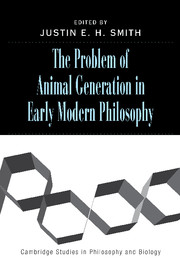Book contents
- Frontmatter
- Contents
- List of Contributors
- Introduction
- I THE DAWNING OF A NEW ERA
- II THE CARTESIAN PROGRAM
- III THE GASSENDIAN ALTERNATIVE
- IV SECOND-WAVE MECHANISM AND THE RETURN OF ANIMAL SOULS, 1650–1700
- V BETWEEN EPIGENESIS AND PREEXISTENCE: THE DEBATE INTENSIFIES, 1700–1770
- VI KANT AND HIS CONTEMPORARIES ON DEVELOPMENT AND THE PROBLEM OF ORGANIZED MATTER
- VII KANT AND THE BEGINNINGS OF EVOLUTION
- Bibliography
- Index
Introduction
Published online by Cambridge University Press: 06 August 2009
- Frontmatter
- Contents
- List of Contributors
- Introduction
- I THE DAWNING OF A NEW ERA
- II THE CARTESIAN PROGRAM
- III THE GASSENDIAN ALTERNATIVE
- IV SECOND-WAVE MECHANISM AND THE RETURN OF ANIMAL SOULS, 1650–1700
- V BETWEEN EPIGENESIS AND PREEXISTENCE: THE DEBATE INTENSIFIES, 1700–1770
- VI KANT AND HIS CONTEMPORARIES ON DEVELOPMENT AND THE PROBLEM OF ORGANIZED MATTER
- VII KANT AND THE BEGINNINGS OF EVOLUTION
- Bibliography
- Index
Summary
πῶς δ΄ ἄν΄ κε γένοιτο; εἰ γὰρ ἔγεντ΄, οὐκ ἔστ΄, οὐδ΄ εἴ ποτε μέλλει ἔσεσθαι. τὼς γένεσις μὲν ἀπέσβεσται καὶ ἄπυστος ὄλεθρος.
(How could [what is] come to be? For if it came into being, it is not: nor is it if it is ever going to be in the future. Thus coming to be is extinguished and perishing unheard of.)
Parmenides, from Simplicius, In Phys. 78, 5; 145, 5, 19–21.οὐσια δε ἐστιν ἡ κυριώτατά τε καὶ πρώτως καὶ μάλιστα λεγομένη, ἣ μήτε καθ΄ ὑποκειμένου τινὸς λέγεται μήτ΄ ἐν ὑποκειμένῳ τινί ἐστιν, οἷον ὁ τὶς ἄνθρωπος ἢ ὁ τὶς ἵππος.
(Substance in the truest and strictest, the primary sense of that term, is that which is neither asserted of nor can be found in a subject. We take as examples of this a particular man or a horse.)
Aristotle, Categories 2a 11–14.At first glance, the unifying theme of the essays collected here may easily appear to the historian of philosophy to reside in one of the narrower alleyways of this history and certainly not along one of its grand avenues. By the nineteenth century, to be sure, embryology had come into its own as an area of scientific investigation, one whose questions were to be answered by experiment and whose answers were not seen as granting insight into any deep and timeless philosophical mysteries.
The perception could not have been more different in classical Greek thought.
- Type
- Chapter
- Information
- Publisher: Cambridge University PressPrint publication year: 2006
- 3
- Cited by

